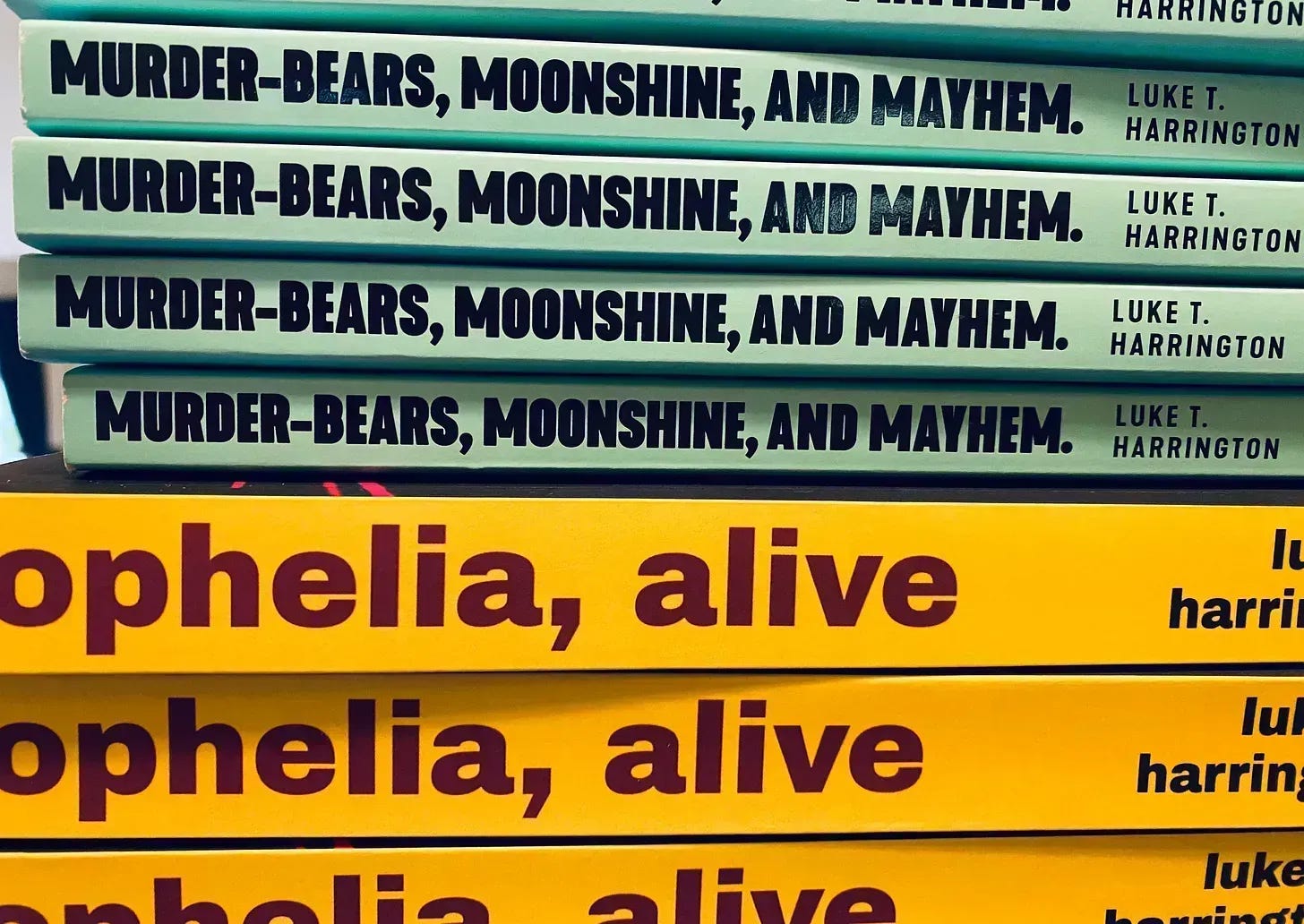Why you shouldn't trust a thornbush with political ambitions
Ask a church receptionist #12
Welcome to another installment of Ask a church receptionist, a monthly column where I answer your questions about the Bible, Christianity, and what ever happened to those tiny tables they used to put on top of pizzas.
Dear church receptionist,
What’s the deal with the parable of the trees in Judges 9? The trees are looking for a king, but none of them want to be the king, so then the thornbush threatens to murder everyone? I realize that Judges is one of the “weird” books of the Bible, but at least most of it makes sense. What the heck is the parable of the trees supposed to mean?
Thanks,
I’M STANDING BEHIND YOU RIGHT NOW
Dear I’M NOT FALLING FOR THAT AGAIN,
For whatever it’s worth, the story you’re referring to is technically a fable, not a parable, and yes, folklorists do draw a distinction. A parable is a lesson hidden in a realistic story (which is why all of Jesus’s parables are about real stuff like agriculture and weddings), while a fable is a lesson hidden in a fantasy story (e.g., something about talking plants or animals). I don’t know if that matters to anyone out there, but this whole column is predicated on the possibility that someone out there cares about the nerdy minutiae of religious arcana, so I thought I’d mention it.
Now—as to the what the story means (after the break):
Hey there, stranger! Welcome to my newsletter. If you sign up to receive it in your email inbox, I’ll send you a free digital copy of my award-winning debut novel, and enter you in a drawing to win a signed paperback copy of each of my books. Paid subscribers get even more! Click here for more info, or else just enter your email address here:
As you say, the Book of Judges is a weird book, even by biblical standards. For anyone totally unfamiliar, it tells the story of the interim period between Israel’s conquest of the Holy Land and the establishment of an Israelite monarchy—so, the stuff between Joshua fightin’ the Battle of Jericho and David pummeling giants, more or less. The book itself is mostly an extended argument for the need for a monarchy, describing the evil and chaos that Israel repeatedly descended into without a centralized, God-ordained authority (“In those days,” goes the author’s favorite refrain, “Israel had no king; everyone did what was right in their own eyes”).
To that end, there’s a unique cyclical structure in its storytelling: Things are fine in Israel, until the Israelites decide it would be fun to worship idols; God punishes them by allowing a neighboring tribe to conquer and subjugate them; the people cry out to God for mercy (and extra-super-pinky-swear they’re done with the idols this time, for realsies); God raises up a “judge” (i.e., a military leader) to restore Israelite independence; then the whole thing starts over. If you know about larger-than-life biblical figures like Samson or Gideon, you have an idea of the sort of thing that goes down in Judges.
It’s in the story of Gideon—actually in a weird appendix to it—that we get the fable of trees.
The story of Gideon is one you’ve probably heard if you’ve been to Sunday school—basically, he banishes the occupying Midianites in the most theater-kid way possible—but the less Sunday school–friendly bit of the Gideon arc happens after his victory. The Israelites ask Gideon to be their king, but he refuses, saying, “The Lord shall rule over you,” which sounds nicely humble and democratic (or theocratic or whatever), but in practice just leaves a gaping power vacuum. Gideon then exacerbates that problem by fathering no less than seventy sons, each of whom ends up with his own little faction of Israelite supporters, whether he wants it or not.
Then Gideon’s illegitimate son Abimelech gets a very big-brain idea: If I just murder the seventy other guys, they’ll HAVE to make me king! He proceeds to do exactly that, amassing a groundswell of support in the process (who doesn’t love a good mass-murderer?)—but then the one brother he failed to kill, Jotham, cuts his campaign short by standing up and telling this fun little story:
One day the trees went out to anoint a king for themselves. They said to the olive tree, “Be our king.”
But the olive tree answered, “Should I give up my oil, by which both gods and humans are honored, to hold sway over the trees?”
Next, the trees said to the fig tree, “Come and be our king.”
But the fig tree replied, “Should I give up my fruit, so good and sweet, to hold sway over the trees?”
Then the trees said to the vine, “Come and be our king.”
But the vine answered, “Should I give up my wine, which cheers both gods and humans, to hold sway over the trees?”
Finally all the trees said to the thornbush, “Come and be our king.”
The thornbush said to the trees, “If you really want to anoint me king over you, come and take refuge in my shade; but if not, then let fire come out of the thornbush and consume the cedars of Lebanon!” (Judges 9:8–15)
So what’s Jotham’s point here? In brief, he’s trying to argue that Abimelech’s desire for power is, by itself, sufficient to disqualify him from wielding it. Each of the first three trees, when offered the kingship, declines on the grounds that it’s already doing something useful and important; the thornbush accepts the gig seemingly because it has nothing better to do. Then it offers the other trees “shade,” which thornbushes are not particularly good at giving, and threatens dissenters with fire, which thornbushes are highly adept at spreading—all stick, no carrot.
Some of the commentaries I’ve looked at suggest that each of trees1 represents one of the previous potential rulers of Israel (per medieval rabbi Rashi, for instance, the olive, fig, and vine represent the judges Othniel, Deborah, and Gideon, respectively) which might be valid, but doesn’t strike me as necessary for grasping Jotham’s main point: that we ought to be skeptical of giving power to anyone who actually wants it.
It’s a message I think we can all relate to—how many elections (presidential and otherwise) have there been where the overwhelming sentiment among voters was, “Really? These are the two best people our country/state/locale has to offer?” Well, no—these are just two people who wanted power badly enough to have devoted their lives to pursuing it.2 The actual best people your country/state/locale has to offer are already busy running soup kitchens, teaching kindergarten, inventing life-saving medical tech, and (obviously) working as church receptionists.
Regretting that I have but one life to give for my parish,
—the church receptionist 🕹🌙🧸
Got a question about the Bible, Christianity, or anything else for a real, honest-to-God church receptionist who literally wrote the book on the Bible? Send it to luke.t.harrington@gmail.com, or just click the button below:
⬅️ In case you missed it: A brief romance involving Godzilla
Read my book about the Bible for free by becoming a paying subscriber! (It’s cheaper and more informative than supporting a televangelist!)
Hey, thanks for reading! If you’re new to this newsletter, here’s how it works: Everyone who signs up to receive it in their email inbox gets a free digital copy of my award-winning debut novel, Ophelia, Alive: A Ghost Story! Anyone who becomes a paid subscriber gets even more:
All monthly paid subscribers ($5/month) will get a free digital copy of Ophelia, Alive and my award-winning nonfiction debut, Murder-Bears, Moonshine, and Mayhem: Strange Stories from the Bible to Leave You Amused, Bemused, and (Hopefully) Informed.
Anyone who signs up for an annual subscription ($50/year) will receive both digital books, plus a signed paperback book of their choice!
Anyone who takes the plunge and becomes a founding member ($200/year or name-your-own price) will receive both digital books and both signed books!
PLUS: Everyone who signs up (free or paid) gets entered in a monthly drawing for a signed book! Why? Because I like you.
(To learn more about the deal and the blog, click here!)
Just enter your email address below for a free book and a weekly reminder that I still exist:
Congrats to last month’s winners, kaarinp and gabas! (If you are one of those people, please reach out to me! I’ve emailed you twice to no response!) I’ll run the next drawing Mar. 1! 🕹🌙🧸
Yes, fine, only two of the four characters here are technically trees in the modern biological sense of the word. Words can mean different things in different contexts, bro.
See also: Reddit mods





